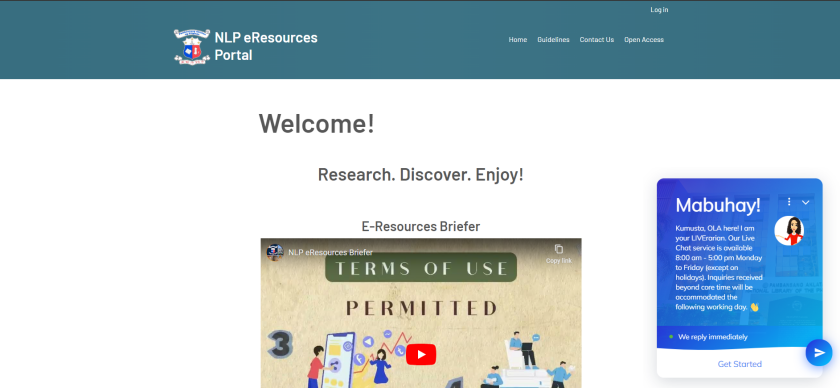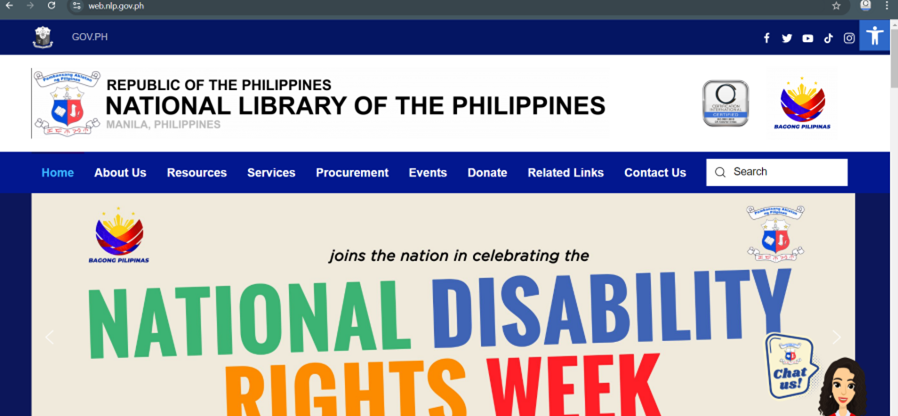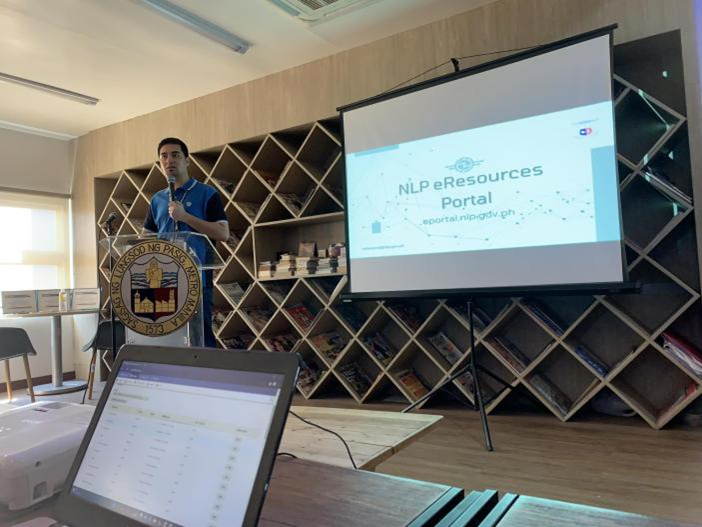Equity and Accessibility: The National Library of the Philippines’ Gateway to Virtual Reference and Information Services
30 November 2024
The National Library of the Philippines (NLP), through its Reference Division (RD), has implemented various methods to provide virtual reference and information services to the public. These services aim to improve access to the library’s resources and services, especially for those who are unable to visit in person. The COVID-19 pandemic accelerated the development and expansion of virtual library services at NLP, ensuring uninterrupted access to information and resources while adhering to minimum health protocols. It leveraged human and technological resources to ensure widespread access to information resources across the country.
In 2021, at the peak of the COVID-19 pandemic, NLP launched its NLP e-Resources Portal, or the NLP ePortal. This initiative was a response to the challenges brought about by restricted access to reliable information resources. This ePortal was designed and created by NLP’s Reference and Information Technology divisions to meet the needs of individuals during this unprecedented time.

The NLP ePortal serves as a virtual shelf of various NLP-procured and subscribed online databases. These include local and foreign multidisciplinary e-journals, e-books, research papers, collection of theses and dissertations, e-newspapers, e-magazines, audiobooks, videos, free and open-access online resources. It serves as a reference point for information in addition to the online catalogue, where users can search and locate information resources. Since its launch in 2021, the NLP ePortal recorded 46,353 NLP-authorised users in addition to the recorded 213,316 who repeatedly accessed the various online databases nationwide. Furthermore, the utilisation rate has soared to an impressive 106% in the first semester of 2024, surpassing the 2023 data with a remarkable 301% increase from 2022.
The RD of NLP has expanded online reference services to include query submissions and assistance beyond traditional methods such as phone calls and emails. In June 2022, the NLP launched its Online Library Assistant, or simply OLA. This platform promises to improve library patrons’ experiences and provide easy access to library resources and services from anywhere with an Internet connection, in conjunction with the NLP ePortal. This democratisation of access enables patrons to interact with the library’s huge collection regardless of location, seek research assistance, navigate NLP services with ease, and receive real-time responses to inquiries from knowledgeable NLP librarians from the comfort of their own homes or offices.
OLA provides a seamless and user-friendly experience and is visible through the NLP website. It also handles inquiries from various NLP social media accounts, such as Facebook Messenger and Instagram, due to its integration functionality, which makes it even easier for patrons to get help from the library. Its purpose is to offer instructional information and specialized services catering to the diverse needs of NLP’s clients.

Moreover, in the first half of 2024, OLA has catered to 6,634 offsite library users, more than double the number served in its first two years. OLA has served 811 clients in 2022 and 1,811 in 2023, respectively. The first half of this year alone has posted a 718% increase from its initial year in 2022. The majority of these inquiries (47.05%) are handled by chatbots designed to answer frequently asked questions on different NLP services such as research, application of numbering systems and copyright registration, readers’ services, and other NLP services. The remaining 52.96% are answered by LIVErarians – the term that we have coined to describe our librarians assigned as chat agents. To expand on the effectiveness of its purpose, 33.55% are questions on research and reference sources, 1.13% of which are research questions about the NLPs Filipiniana Collection. 2.03% are questions and clarifications on copyright registration, while 1.60% are from numbering system (ISBN, ISSN, and ISMN) inquiries. Other inquiries are questions spread across different NLP services and events or celebrations organized by NLP (3.44%) and inquiries directed to other government agencies (1.04%), respectively.

The drastic increase in client inquiries can be attributed to the growing number of users of the NLP website as well as OLA’s addition to other portals such as the NLP ePortal and the International Standard Numbering System – Philippine Online Application Systems (INS-POAS) website for numbering system registration. It can also be claimed that the recent upgrade in its functionality further boosted its potential. Chatbots were added to OLA, which has helped deal with client queries even when the library is closed or during the holidays. This means that every user can get help whenever they need it. Another facet to this is OLA’s recent integration with NLP’s social media accounts, mainly Facebook and Instagram. OLA has benefitted from NLPs boosted social media presence and in return, has made this presence felt by making NLP’s online reference services easily accessible across different platforms.
Efforts are being made to ensure that all users, regardless of their age, background, or circumstances, can benefit from the library’s resources and services. The NLP ensures that the public is informed about these initiatives through promotion on its social media accounts and by organising activities like orientations and digital literacy drives to help users navigate and effectively utilise virtual reference services and resources. As a result, it has become a crucial service offered by the NLP, going beyond the traditional provision of in-person services and empowering NLP to embrace rapid technological advancements and stay up-to-date with the latest and emerging trends.

Both NLP ePortal and OLA have effectively engaged in growing their user base, demonstrating their potential as valuable tools for enhancing library services, access to library resources, and fostering user engagement. The integration of these initiatives in providing virtual reference services and information resources embodies the essence of IFLA’s “Library without Walls” advocacy, emphasising the responsibility of libraries to provide inclusive and equitable services to meet the diverse needs of its clients and fostering a digitally connected library experience for all.
NLP ePortal and OLA have demonstrated remarkable potential as transformative and efficient tools for enhancing the reference services and overall library service of NLP. Moreover, the steady growth in library users underscores its ability to meet the evolving needs of patrons in the digital age. Currently, the virtual library services of NLP are only beginning to tap into its full potential. As the NLP continues to explore innovative solutions and leverage cutting-edge technologies, virtual reference services are poised to play an even more pivotal role in shaping the future of reference services at NLP.
Contributed by Xenia B. Romero, Librarian III and Gio Karlo J. Fuellos, Librarian II, Reference Division, National Library of the Philippines